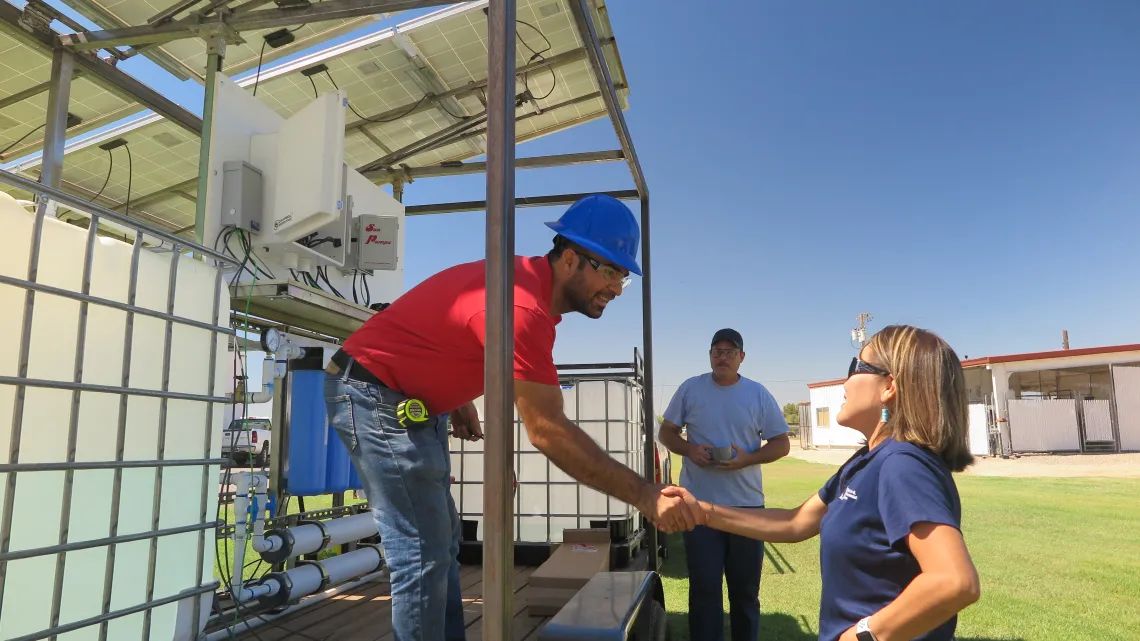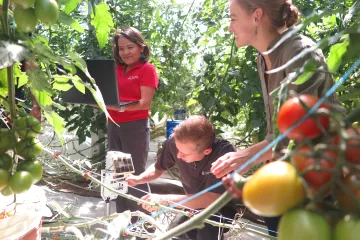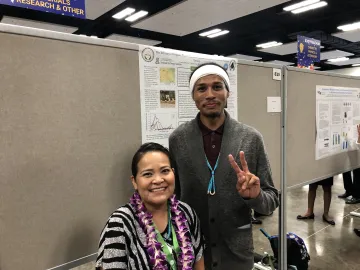Profile on Karletta Chief, PI for Indige-FEWSS

Dr. Karletta Chief is a Professor and Extension Specialist in the Department of Environmental Science at the University of Arizona in Tucson, Arizona. The goal of her research is to improve our understanding, tools, and predictions of watershed hydrology, unsaturated flow in arid environments, and how natural and human disturbances affect soil hydrology. Her work also focuses on how Indigenous communities will be affected by climate change and how to improve hydrological models to identify and mitigate risks.
Dr. Chief was born and raised in Black Mesa, Ariz., on the Navajo Nation and grew up with no running water or electricity. She is very connected with her culture and community and remained so while obtaining her baccalaureate and doctoral degrees.
While much of her work is very technical, she makes it a priority to bring relevant science to Indigenous communities in a relatable and culturally sensitive manner. She feels that being an Indigenous person in her field has provided her with expertise and sensitivity to cultural protocols for working, collaborating, and deepening connections in tribal communities on the Navajo Nation.
As an active tribal member, she notes the importance of building partnerships and trust with tribal leaders - especially when discussing sensitive and contentious subjects like water rights. Working in tribal communities may be challenging, but providing outreach and educational services helps build trust and increased willingness to participate in her research experiences. Straddling identities as a tribal member and an academic researcher, she also understands and respects the cultural aspects of scientific research and why it is not always welcome in tribal communities.

When asked if she ever experiences “imposter syndrome,” she said she recently read an opinion piece that “gave words to her feelings” and realized that she did experience it without understanding the common archetype.
She admits that as a Native in the engineering department at Stanford University, there was a self-imposed need to succeed. Sentiments of being less than qualified resonated throughout graduate school even though she maintained a competitive GPA.
Once practicing as a university professor, to overcome those feelings, she stopped trying to reach out to people in her field as it was difficult to self-assert herself in insular academic working groups. Self-sustained and self-empowered, she focused on her niche interests, studying and publishing on those topics. Eventually, people began reaching out to her for collaborations.
Dr. Chief remarks, "finding collaborators that are passionate about the work that they do and are committed to doing that work while remaining positive even through the challenges, that motivates me and helps fuel the work even further." She highlights the importance of finding individuals and teams that support you because "hard work doesn't feel like hard work when you are committed to it."
Dr. Chief is currently the principal investigator of the NSF-funded Indige-FEWSS program whose goal is "to develop a diverse workforce with intercultural awareness and Food-Energy-Water Security (FEWS) expertise to address FEWS challenges in Indigenous communities." The theme of the research is "the development of novel and sustainable solutions for off-grid production of safe drinking water, brine management operations, and controlled environment agriculture systems."
Dr. Chief’s project goal is "to make a bridge with the Navajo people and various solutions in the FEWS" and to "help develop research that is applicable to the Navajo challenges around FEWS insecurities." Recently, she highlighted how the project is expanding and now collaborating with the Navajo Nation on ways of FEWS mitigation during the COVID-19 pandemic.
Dr. Chief stated that because of partnerships created over the past 3 years, the Navajo leadership asked them to come and talk about the off-grid solar nano-filtration units and greenhouse development to potentially use CARES funding to address insecurities. They are also working with the Navajo Nation Water Access Coordination Group to provide resources and with Dig Deep Water Project to develop partnerships and effective resolutions.
As a result of all these efforts, funding has been secured from the National Institute of Environmental Health Sciences to assess COVID risks and is currently being led by faculty at the UArizona School of Public Health. Dr. Chief said that she "is looking at what are the perceptions of Navajo people to accepting different types of technology" and working with a research team to gain approval from Navajo Nation to ask such questions in their research.

Dr. Chief believes that "it's our [advisors'] job to prepare students for all types of careers. Not all students go into academia and it is important to be able to provide a variety of skills; the grant is to prepare students for the workforce, whatever career they choose." Indige-FEWSS is a unique program because it "provides a funded fellowship to students while they are being trained; it is oriented and works directly with Indigenous communities," teaching students intercultural and professional skills.
While Dr. Chief works with many great individuals, she expressed that her personal highlight of the Indige-FEWSS program was having one of the tribal college students, Larry Moore, Navajo, win a poster presentation at the Society for Advancement of Chicanos/Hispanics & Native Americans in Science (SACNAS) national conference. She detailed how the student worked diligently with faculty and trainees in the program and in the end their success "really demonstrated our connection with and mentoring at tribal community colleges - it was so amazing."
She offers advice to students in the program and those looking to participate: "Don’t hesitate to seek out faculty for advice or input and be persistent," further elaborating that the program is flexible, and "students have the flexibility to make it their own." Her challenge to students is to become "innovative in your own way - don't let it constrain you," something that is applicable in all facets of students' lives - academically and professionally.
